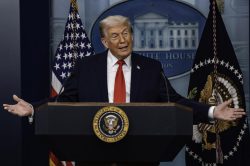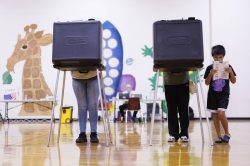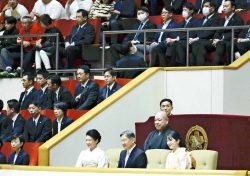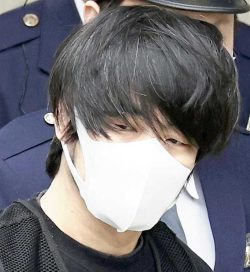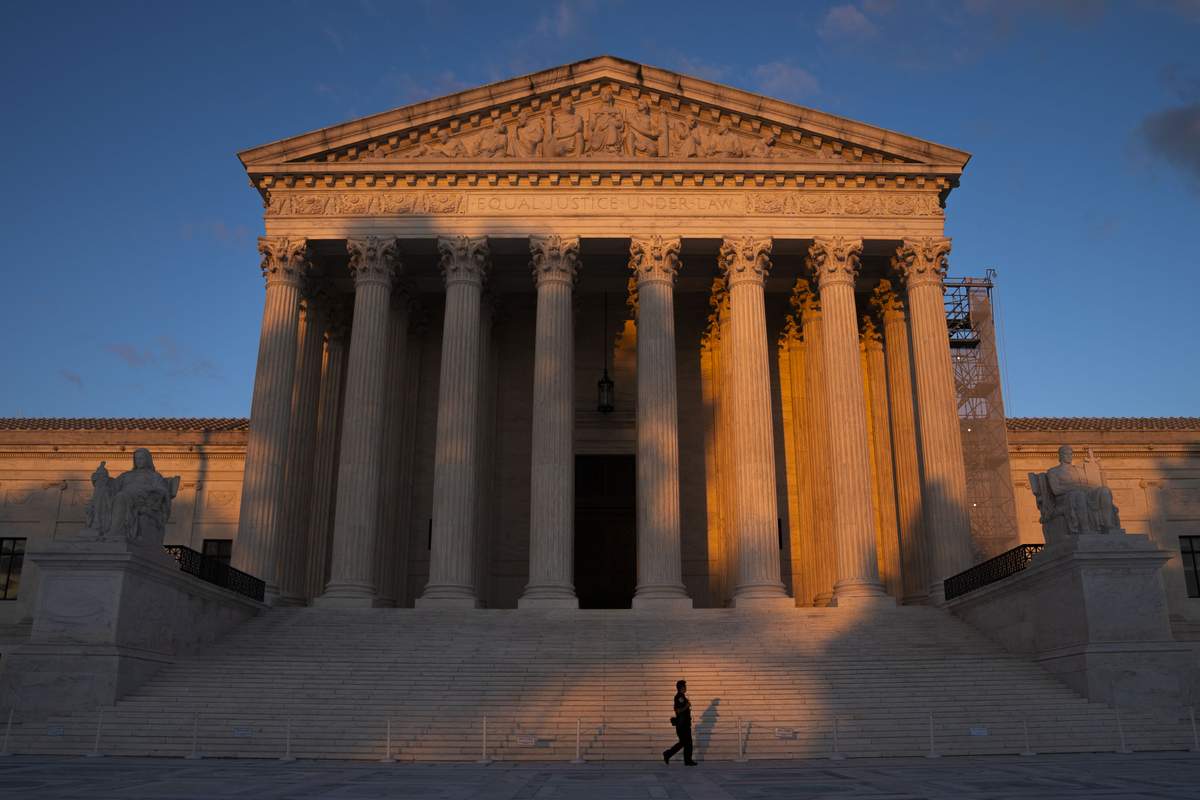
The Supreme Court building in Washington, D.C., on Aug. 21.
17:31 JST, December 19, 2024
The Supreme Court said Wednesday that it will quickly take up TikTok’s challenge to a federal law that would shutter the popular platform next month unless the company divests from Chinese ownership.
The justices said they would consider whether the law, passed with bipartisan support to address national security concerns, violates the First Amendment rights of millions of TikTok users and the owners of the video-sharing platform.
In a sign of the significance of the issue, the court added a special hearing to its calendar, scheduling two hours for oral argument Jan. 10. A ruling could come any time after that.
TikTok had asked the high court to intervene before Jan. 19, the deadline Congress set for TikTok’s China-based parent company, ByteDance, to sell the platform or be barred in the United States. The company wants the justices to put on hold a lower-court ruling that clears the way for the law, which was signed by President Joe Biden.
President-elect Donald Trump, who will take office Jan. 20, has suggested he could try to retain access to the app, adding to the uncertainty surrounding the ban-or-sale law.
Lawmakers passed the measure in response to concerns from U.S. officials that TikTok could be pressured by the Chinese government to covertly manipulate public opinion in the United States or to provide access to Americans’ data.
TikTok has said in court filings that the law is a “massive and unprecedented speech restriction” that will “silence the speech of applicants and the many Americans who use the platform to communicate about politics, commerce, arts and other matters of public concern.”
The justices will be reviewing a unanimous decision from the U.S. Court of Appeals for the D.C. Circuit, which sided with the Justice Department and said the law does not violate the First Amendment in part because it does not target a specific viewpoint.
“The First Amendment exists to protect free speech in the United States,” wrote Judge Douglas Ginsburg, who was joined by Judge Neomi Rao and Chief Judge Sri Srinivasan. “Here the Government acted solely to protect that freedom from a foreign adversary nation.”
Srinivasan, writing separately, said even though millions of Americans may lose an outlet for expression, “the record reflects that Congress’s decision was considered, consistent with long-standing regulatory practice, and devoid of an institutional aim to suppress particular messages or ideas.”
The Supreme Court moved with extraordinary speed this week, agreeing to take the case two days after TikTok filed its emergency request and without waiting for a response from the Biden administration, as is its usual practice.
In its brief order Wednesday, the Supreme Court put off a decision about whether to temporarily block the ban-or-sell law while the litigation continues. The justices could put the measure on hold at some point after oral argument, or allow it to take effect as planned.
The court’s ruling will have broad implications for TikTok’s more than 170 million U.S. users and for the future of free speech online. In recent terms, the court has reviewed other cases involving government interactions with social media platforms, but without issuing decisive opinions on the merits.
In a statement Wednesday, a TikTok spokesperson said, “We believe the Court will find the TikTok ban unconstitutional so the over 170 million Americans on our platform can continue to exercise their free speech rights.”
Many U.S. online content creators depend on advertising revenue from TikTok for their livelihoods, while other small-business owners use the platform for marketing. Numerous other Americans, particularly young adults and teenagers, use TikTok as part of their daily entertainment.
Determined TikTok users in the United States would probably be able to access the app through a VPN or other methods, with enforcement expected to focus on companies that run app stores rather than on individual users.
The case has attracted high-level interest. On Wednesday, Senate Minority Leader Mitch McConnell (R-Kentucky) filed an amicus brief in which he called TikTok’s emergency application for a stay “meritless and unsound” and urged the court to allow the divestiture requirement to take effect Jan. 19.
“TikTok clearly hopes that the next administration will be more sympathetic to its plight than the incumbent administration,” he wrote.
In a statement from the Chinese Embassy ahead of the court’s announcement, a spokesperson said TikTok is “fully registered in accordance with U.S. laws, operates legally and compliantly, and is subject to U.S. oversight.”
The United States “should genuinely respect the principles of market economy and fair competition, stop unjustly suppressing foreign companies, and provide an open, fair, just, and non-discriminatory environment for foreign businesses operating in the U.S.,” the statement said.
China has long barred access to American social media platforms, including Google, YouTube and Instagram.
Civil liberties advocates have urged the court not to allow the U.S. government to limit free speech based on what they characterized as speculative harm.
“The U.S. government should not be able to restrict speech, in this case by cutting off a tool used by 170 million Americans to receive information and communicate with the world, without proving with evidence that the tools are presently seriously harmful,” said David Greene, civil liberties director at the Electronic Frontier Foundation, which joined an amicus brief in support of TikTok’s position.
Top Articles in News Services
-

Prudential Life Expected to Face Inspection over Fraud
-

South Korea Prosecutor Seeks Death Penalty for Ex-President Yoon over Martial Law (Update)
-

Trump Names Former Federal Reserve Governor Warsh as the Next Fed Chair, Replacing Powell
-

Suzuki Overtakes Nissan as Japan’s Third‑Largest Automaker in 2025
-

Japan’s Nikkei Stock Average Alls from Record as Tech Shares Retreat; Topix Rises (UPDATE 1)
JN ACCESS RANKING
-

Univ. in Japan, Tokyo-Based Startup to Develop Satellite for Disaster Prevention Measures, Bears
-

JAL, ANA Cancel Flights During 3-day Holiday Weekend due to Blizzard
-

Japan Institute to Use Domestic Commercial Optical Lattice Clock to Set Japan Standard Time
-

China Eyes Rare Earth Foothold in Malaysia to Maintain Dominance, Counter Japan, U.S.
-

Japan, Qatar Ministers Agree on Need for Stable Energy Supplies; Motegi, Qatari Prime Minister Al-Thani Affirm Commitment to Cooperation




